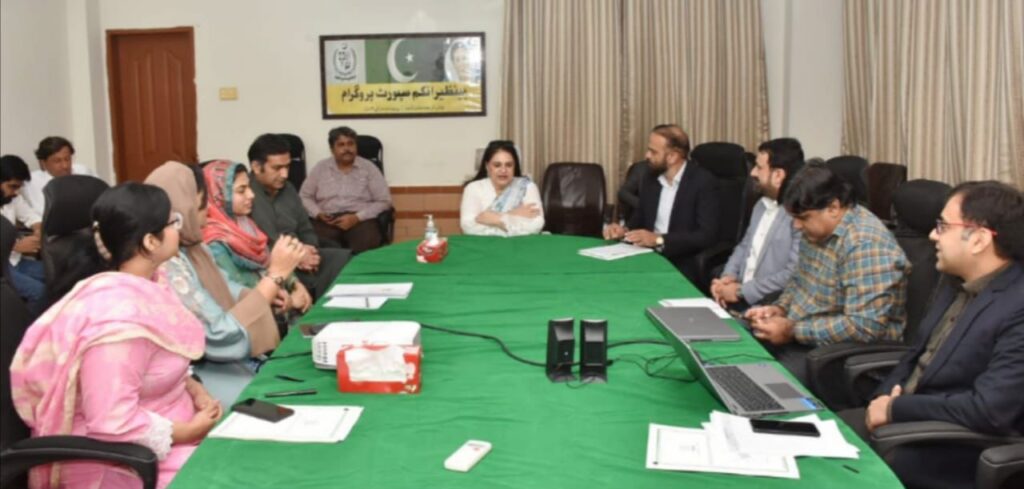
Karachi- Chairperson Benazir Income Support Program (BISP) Mrs. Rubina Khalid visited the Office of Director General- Sindh region for a briefing by the regional team of Sindh Region.
Chairperson Rubina Khalid was briefed through a presentation by the Director General BISP Sindh Region at the Headquarters in Karachi, a detail of the current progress of the region and concurrent programs under BISP were shared with statistical analyses.
Chairperson Mrs. Rubina Khalid stated that Human Resource Development is crucial in alleviating the social status of Pakistan’s population as a whole. She also asked the representatives present to devise a plan through which they start a pilot project to enhance handicraft and artisan industry before which they would have to detect and gather individuals with expertise in this field and bring these women on-board. She also spoke to the team to bring fashion design students from known universities Karachi to help assist BISP with this initiative.
“Once these skill based courses are conducted, proper Certification should be done from institutes that are acknowledged internationally and accepted on the global stage,” expressed Mrs. Rubina Khalid.
Director General BISP- Sindh Region presented the achievements of BISP in Sindh. “BISP executed multiple shock responsive cash transfers like covid-19, flood relief 2022, fuel subsidy 2022, flour subsidy 2023, wheat subsidy 2023 and Sindh government Ramzan package 2024 alongside regular tranches,” he listed.
He further mentioned that Digital, Financial and literacy trainings (DFLT) were being conducted to enhance literacy level of beneficiaries on digital and financial aspects.
BISP Central Zonal office Karachi and STEVTA have signed an MoU to enhance the cooperation for serving poor beneficiaries. This will be to ascertain enrolment status of STEVTA Students and in-house excercise.
Chairperson advised the DG to ensure that the working within this MoU is expedited and done within a span of six months, she urged the management of Sindh Region to pay heed to quick delivery of agreed upon terms.
He also stated some other programs namely Benazir Taleem Wazaif and
Benazir Nashonuma Facilitation centres that were aimed at educational assistance and healthcare initiatives respectively.
She clarified that there is a lot of misconception about this program, “it is often conflated with social security programs are spread around the globe for people who are unable to support themselves.” BISP is not a social security or a charity program, it’s a program that assists those who are able and willing to work, in some cases already possess the skill and are unable to earn a sustainable income. “Skill development was an aspect that was discontinued previously but it needs to be revived in order to increase the scope of this program.”
She duly expressed that Human Resource development is the main focus for BISP. The overpopulation that is otherwise a burden, needs to be turned to an advantage by teaching skills to individuals to engage them into the workforce. “A meeting with Overseas foundation was conducted to analyse what the international avenues for work are and how they can be used as models for Pakistani workforce,” she added.
“Induction into BISP necessitates a valid CNIC, this condition has enabled a multitude of women of Pakistan an official identity and BISP played an exemplary role in enabling this very basic but extremely crucial right of an individual as part of any society,” the Chairperson remarked as she lauded this move.
She stressed upon the importance of Handicrafts Development and Makerkting. Supporting beneficiaries in producing high-quality, locally made handicrafts by linking beneficiaries to local markets and e-commerce platforms for sales. “A model with Bank Alfala in District Khairpur is an initiative to create a mall and cater to this particular market,” She urged DG BISP Sindh to look into for a possibly pilot program of such nature.
Chairperson Mrs. Rubina Khalid appreciated the work being carried out and expressed that any inadequacies have also been noted. She lauded the team for working despite limited resources and alleviating the plight of those marred with financial duress. “Poverty alleviation demands financial assistance alongside skill based learning which can only be made possible through teaching skills to women who posses the talent, but lack resources and support,” she added as she concluded her visit.
